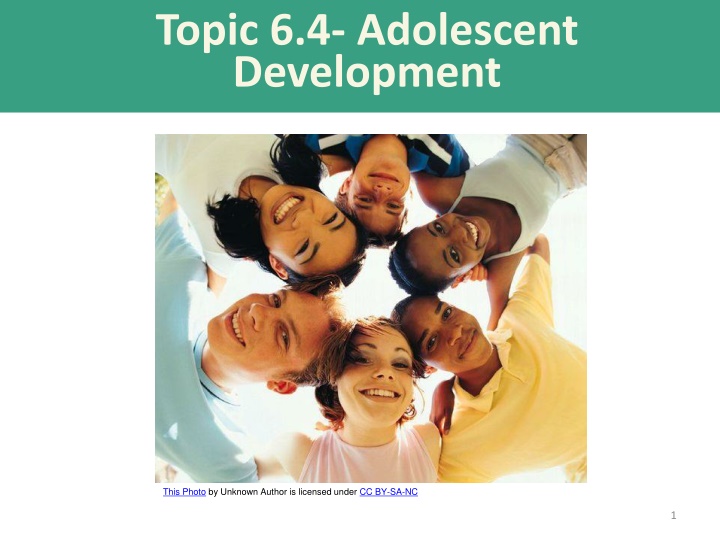
Adolescent Development: Puberty, Brain, Cognitive, and Social Growth
Explore the stages of adolescent development including physical changes during puberty, brain development, cognitive reasoning, and social identity formation according to Erik Erikson's model. Discover how adolescents navigate these crucial developmental milestones and the challenges they face in forming their sense of self.
Uploaded on | 0 Views
Download Presentation

Please find below an Image/Link to download the presentation.
The content on the website is provided AS IS for your information and personal use only. It may not be sold, licensed, or shared on other websites without obtaining consent from the author. If you encounter any issues during the download, it is possible that the publisher has removed the file from their server.
You are allowed to download the files provided on this website for personal or commercial use, subject to the condition that they are used lawfully. All files are the property of their respective owners.
The content on the website is provided AS IS for your information and personal use only. It may not be sold, licensed, or shared on other websites without obtaining consent from the author.
E N D
Presentation Transcript
Topic 6.4- Adolescent Development This Photo by Unknown Author is licensed under CC BY-SA-NC 1
Physical Development Puberty is the time of sexual maturation (becoming physically able to reproduce). During puberty, increased sex hormones lead to: primary and secondary sex characteristics. some changes in mood and behavior. Height changes are an early sign of puberty. Because girls begin puberty sooner than boys, girls briefly overtake boys in height. 2
Adolescent Brain Development During puberty, the brain stops automatically adding new connections, and becomes more efficient by rewiring. pruning away the connections not being used coating the well-used connections in myelin, in order to speed up nerve conduction This makes early adolescence a crucial time to learn as much as you can! Frontal Lobes are Last to Rewire The emotional limbic system gets wired for puberty before the frontal judgment centers of the brain get wired for adulthood. As a result, adolescents may understand risks and consequences, but give more weight to potential thrills and rewards. Teens have developed a mental accelerator, but are not in the habit of using the brakes. 3
Adolescent Cognitive Development According to Jean Piaget, adolescents are in the formal operational stage. They use this reasoning to: think about how reality compares to ideals. think hypothetically about different choices and their consequences. plan how to pursue goals. think about the minds of others, including what do they think of me? 4
Social Development: Erik Erikson (1902-1994) Erik Erikson s model of lifelong psychosocial development sees adolescence as a struggle to form an identity, a sense of self, out of the social roles adolescents are asked to play. Adolescents may try out different selves with peers, with parents, and with teachers. For Erikson, the challenge in adolescence was to test and integrate the roles in order to prevent role confusion (which of those selves, or what combination, is really me?). Some teens solve this problem simply by adopting one role, defined by parents or peers. 5
Other Eriksonian stages on the minds of adolescents While currently in the identity vs. role confusion stage, adolescents have ideally just finished working through the tension of competence vs. inferiority. They are ready after adolescence to take on the challenge of intimacy vs. isolation. 7
Adolescence, the sequel Emerging Adulthood In some countries, added years of education and later marriage has delayed full adult independence beyond traditional adolescence. This seems to have created a new phase which can be called emerging adulthood, ages 18-25. 8
